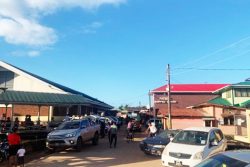The legal challenge to the National Assembly’s Committee of Privileges’ decision to suspend eight opposition Members of Parliament was yesterday thrown out with the Court ruling it does not have the jurisdiction to intervene in the internal matters of the House.
In the ruling handed down by Justice Damone Younge in the High Court in Demerara, the MPs were also ordered to pay costs to the state of $350,000 each by February 6th. The ruling came months after the eight MPs mounted a legal challenge against their suspension, in which they said that the principles of natural justice were breached as they were not given a hearing before the Committee of Privileges. The MPs were suspended from Parliament over their tumultuous bid on December 29 2021 to prevent the passage of the Natural Resource Fund (NRF) Bill which saw the forcible removal of the Parliamentary Mace. The Privileges Committee had recommended that Opposition Chief Whip Christopher Jones, Ganesh Mahipaul, Sherod Duncan and Natasha Singh-Lewis be suspended for four consecutive sittings and Annette Ferguson, Vinceroy Jordan, Tabitha Sarabo-Halley and Maureen Philadelphia be suspended for six consecutive sittings.
Referencing Court cases from the United Kingdom and Fiji in similar matters, Justice Younge said the Court forms the view that the National Assembly is vested with exclusive control over the management of its proceedings when it comes to internal operations.
“The National Assembly is empowered by the Constitution itself, to make its own rules for the conduct of its business and for the conferment of powers and privileges of its members,” she said. Justice Younge pointed out that the Court agrees wholeheartedly with the proposition of the cases decided over the centuries that matters of such nature are not cognizable in the Court except in the instances where there has been some violation of the provisions of the Constitution.
“The matters of which the applicants in this case complain arose out of internal proceedings of the House, which are not specifically provided for in the Constitution, and as such, fall within the category of being wholly internal proceedings of the National Assembly which this Court ought not to interfere…” with she said in delivering her ruling yesterday afternoon.
Further, Justice Younge stated that the argument by the applicants citing a breach of their constitutional rights, is without merit since it stemmed from internal proceedings of the National Assembly and are not a justiciable inquiry. Justice Younge emphasised that with applicants taking the oath of office they were aware and subject to the rules and laws governing the House.
“…the applicants having taken the oath of office are bound by, and subjected to, the rules governing the operations of the National Assembly made pursuant to Article 165 [of the Constitution]”, she said, while pointing out that the Standing Orders of Parliament were not challenged by the applicants.
“The Privileges Committee which produced the appealed report, is a creature of the National Assembly and has been established by Standing Orders. Its functions have been defined by Standing Orders to which all members of parliament, including the applicants must adhere to“, Justice Younge added.
It was at this point the Judge ruled that the applicants’ case is not exceptional and does not warrant exercise in the Constitutional jurisdiction.
“…this Court refrains from inquiring into the internal proceedings of the National Assembly and from exercising its jurisdiction to determine the merits of the applicants’ exhibit…” she stated. Justice Younge also pointed out that the Court is mindful of trespassing in the realm of the legislature and usurping the authority of this arm of the state to regulate its own procedure which is specifically provided for in the Constitution. In concluding her ruling on whether the Court has the jurisdiction to listen to the applicants’ case, she ruled that the Court will not entertain the fixed date application.
Shadow Attorney General, Roysdale Forde SC, had filed a fixed date application with urgent notice in the High Court.
During the Court’s proceedings, Attorney General, Anil Nandlall SC, had filed a Notice of Application (NoA), disputing the Court’s jurisdiction to hear the application. Nandlall was resolute that Parliament, as a sovereign entity, is accorded “absolute and exclusive” privilege which allows it to run its own affairs, free from outside interference. Forde, who also represented the suspended MPs, however contended that having not been afforded their constitutional right of being heard, the suspended MPs have a related right to approach the Court for redress. At the end of the Judge’s ruling, in consideration of costs, Nandlall proposed that each applicant pay costs at $250,000. However, in rebuttal an attorney for the applicants Selwyn Pieters asked the Court to not consider costs. He argued in his plea for the Court’s discretion that his clients were not in a position to pay costs and reminded the Court they were suspended without pay and have not worked for months. He said that the Court’s ruling should be regarded as punishment enough as the parliamentarians will be aware of the rules and obligations going forward. However, Justice Younge after listening to the plea set costs at $350,000 per applicant to be paid on or before February 6th.
On July 28th, the suspended Parliamentarians Christopher Jones, Ganesh Mahipaul, Sherod Duncan, Natasha Singh-Lewis, Annette Ferguson, Vinceroy Jordan, Tabitha Sarabo-Halley and Maureen Philadelphia received their letters of suspension from the National Assembly informing them that they would not be receiving their salaries and other benefits during that period. A week prior, the House voted to suspend Jones, Mahipaul, Duncan and Singh-Lewis for four consecutive sittings while Ferguson, Jordan, Sarabo-Halley and Philadelphia were suspended for six consecutive sittings. Their suspension came as a result of their bid on December 29th, 2021, to obstruct the passage of the Natural Resource Fund bill. On that chaotic night, APNU+AFC parliamentarians were scattered throughout the parliamentary chamber chanting “no thieving bill must pass,” while blowing whistles and banging on the tables. The Speaker tried, unsuccessfully, to restore order to the House.
In the end, Ferguson grabbed the ceremonial mace and made a dash for the door but was tackled by the Sergeant-at-Arms and another parliamentary security officer. At that time other Opposition MPs rushed to her aid even as Singh was still on the floor making his presentation. Minister of Parliamentary Affairs and Governance, Gail Teixeira, later moved a motion to refer the eight MPs to the Committee of Privileges. The Committee’s report, which recommended the suspension, was tabled in Parliament on July 21st and adopted around 1:30 am on July 22nd after the APNU+AFC MPs left the chambers.
The suspended MPs were asking the Court to declare that the report of the Committee of Privileges on the Privilege Motion dated January 24, 2022, was unconstitutional, null, void and of no legal effect. They were also asking the Court to determine that the report breached the principles of natural justice since they were not guaranteed their rights prescribed under Article 144 (8) of the Constitution. In their application, the MPs had filed a Notice seeking, among other things, an injunction staying their suspension.







